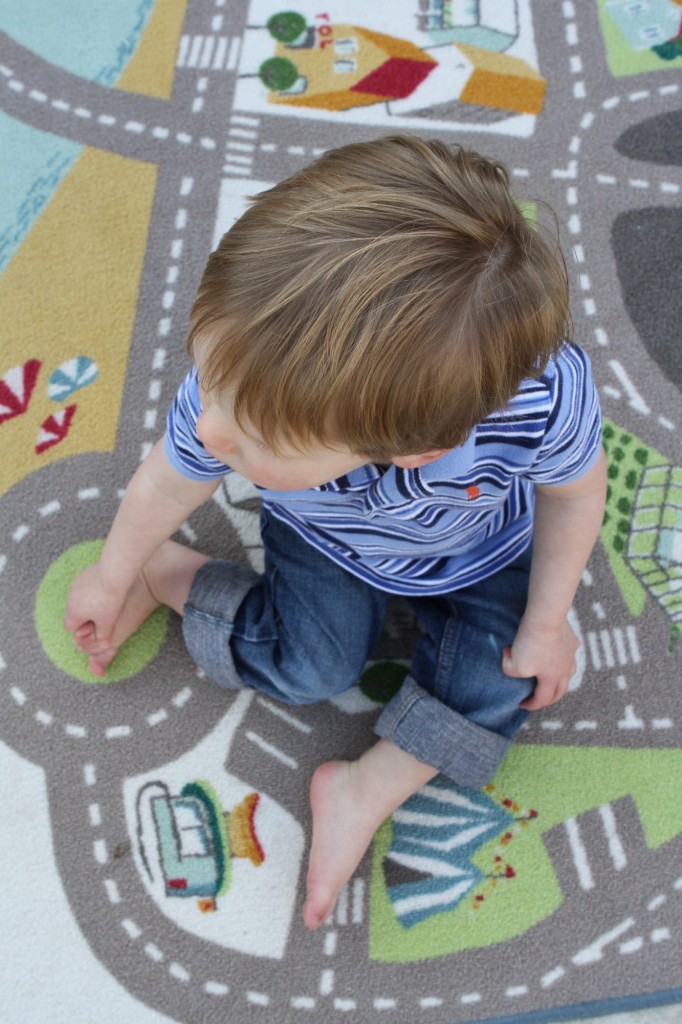
By Nicole Matos
My three-year old son and I are on the floor. Bless his occupational therapist, but her daily home-based tasks are killing us. I place blocks in a line and run a car over this road. “No!” Alex charges between me and the blocks and tries to rip the cars from my hands. “No! You don’t! I tell you!”
“Well, you can play your way”—I point to his pile of blocks—“But I will play this way. We can play differently.”
You and I are different, we are different people. His therapist (the “feelings” one, not Speech or OT) pushes me to say this, after I have explained the hairdryer battles, the sign-he-saw-that-I-didn’t-see, his new insistence that I have a penis, although he was fine before with me and my vagina for babies to be born out of. Babies like Alex? Did it hurt? Did we do it in a hospital?
But now his fears and his tantrums have settled around the truth that he and I do not always match. Over and over he tells me that I have a penis—I TOLD YOU, I TOLD YOU, as if his insisting on it will make it so. When I try, “We are different,” he goes crazy: “No! Not different! Not different! No! Please!” I reassure him that I love him, nothing is changing, we are already different, we are, after all—a bizarre sort of Platonic evidence I pull out of my ass—not always in the same place at the same time.
But the cars: “Alex will accept adult variations in his play.” He seems to know that this is an object lesson, a battle of reality paradigms, a showdown. “No! No! I’m so mad at you! I want to poke you in the eye [and does], I want to hit you [and does]!” And I hate my whole life. I hate every imaginary parent who has ever played cars with their imaginary child. I hate all my other imaginary children: those twenty eggs I saw on the ultrasound that month he was conceived. Nineteen other possible Alexes, but none of them here to help us, now.
Why? Why? Why no cars allowed on the road? And yet, the next day—“I want to play cars, Mommy”—he lines up the blocks, runs the car over the top, and eyes me carefully. “This car needs to wait his turn. Uh-oh! We can solve the problem! Look, relax and solve the problem!” Trying again. Showing me. So, what can we do to get second-day Alex on the first day? How do we beat down first-day Alex so second-day Alex can live, live, live?
If I had another child in my house, a child that picked up the car and ran it on the road, easily, heedless, I would backhand that child. I would sink my teeth into his shoulder and suck.
I tell my husband that, in my secret evil angry head, I call the therapy programs that are saving our lives—saving our son, by line items and inches—the Ghetto Where What You Wished Wouldn’t Happen Happened. That when I see the words “Special Needs” (especially if they are surrounded by rainbows or smiley faces), I think they should be renamed “Outrageous Needs.” That is how I think of Alex’s needs, on those days when he is just a bleat of screeching irrational anxiety—“Give me my blanket! No blanket! Take off my sock! No sock! [Hits me.] Mommy, I’m sorry! Mommy don’t go!” Outrageous needs!
And, I tell my husband, I am scared I have a worn spot in my mothering now that just won’t go away—a worn out, sagging, trampoline spot that other parents have time to patch up because it isn’t so often used, so outrageously. And it is holding—it has to hold, I have to make it hold. But what if it breaks? What if my love somehow leaks out?
The next day there is third-day Alex—not struggling, not overcompensating for having struggled, but just himself, total, complete. We have a great time at the park. We ride the swings and the slide and play pretend in the way that feels safest to him, in exaggerated fake voices, with the reminding anchor, “This is just pretend” sprinkled throughout. An old woman gives him a huge lollipop, spontaneously, and I let him take it, not thinking how close it is to Speech.
I spend the ride setting it up: “We will need to say goodbye to the lollipop, for Speech, but I promise it will be in the car when you get back.” And he does it voluntarily, giving it up, even waving the lollipop bye bye. But then he can’t hold it together. He lies down on the sidewalk, telling me with his body, I am overcome. He doesn’t want me to hold him, but I say I love him, touch his hand, and we count to ten and to ten again, calming.
After Speech, his therapist says, “He actually did great today—he used a big word, ‘promised’!” We look at each other, my son and I, co-conspirators.
Back at the car, the lollipop is waiting, and I grind it in for next time, the prophecy I’m determined, through all my human resentment and selfishness, to make true. “If Mommy promises, I will only promise when it is true. I will only promise if I am certain.”
And he says, sincerely, “Thank you mommy Alex promise.”
•••
NICOLE MATOS is a Chicago-based writer, professor, roller derby girl, and special needs mom. Her work has appeared in such publications as Salon, The Classical, The Rumpus, theNewerYork, The Atticus Review, Monkeybicycle, THE2NDHAND txt, berfrois, Chicago Literati, and many others. Follow her on Twitter at @nicole_matos2.

 Follow
Follow